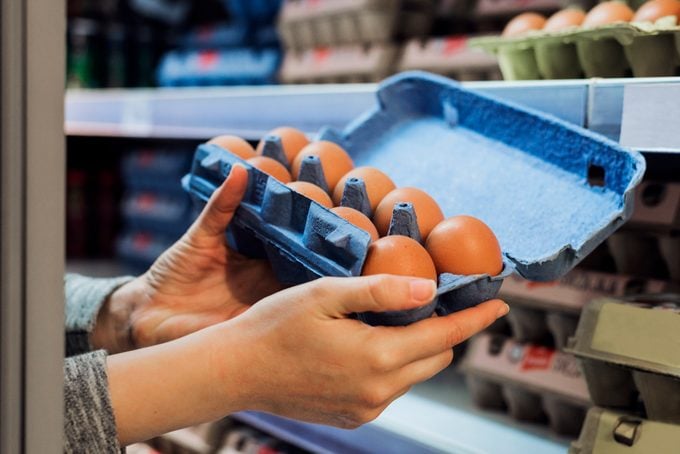Cage-Free vs. Free-Range Eggs: How Are They Different?
Updated: Dec. 05, 2023

If label terminology like cage-free vs. free-range eggs confuses you at the grocery store, this guide will help you determine the best eggs to buy based on your preferences.
It seems like every other week, new terminology shows up on food labels. Foods can be low-calorie or reduced-calorie; light or lite; low-fat or lean and what the heck are natural flavors, anyway? It’s no wonder there are so many ways we’re reading food labels wrong. Basic foods like eggs should be simple, but their packages are not. We’re here to explain the difference between cage-free vs. free-range eggs.
While you’re at it, you can also explore how to store eggs and the difference between brown and white eggs.
What are cage-free eggs?
According to the USDA, cage-free eggs are eggs from chickens that have access to fresh food and water and have “freedom to roam” during the laying cycle. But that doesn’t mean conditions are ideal. The majority of cage-free layers are kept in indoor facilities and are often packed in tightly; it’s standard to allow each hen one square-foot of space.
What are free-range eggs?
Technically, what we’re talking about here are eggs from free-range chickens, as the eggs themselves can’t roam around! Like cage-free chickens, free-range chickens must have unlimited access to food and water. Additionally, they must have the freedom to go outdoors for 51% of their lives, specifically while they are laying. However, this doesn’t mean that the chickens necessarily spend time outdoors, nor that the outdoor space is a pasture.
What are pasture-raised eggs?
The standard for labelling eggs from pasture-raised chickens is that the birds must have continuous, free access to the outdoors during their normal growing cycles. A bird that is totally confined at any point would not qualify for the pasture-raised label, and neither would their eggs.
Eggs labeled pasture-raised have passed Humane Farm Animal Care (HFAC) certification, which guarantees that the chickens have been raised on a vegetation-covered pasture with 108 square feet per chicken for a minimum of six hours per day.
The chickens are also fed only grains without animal byproducts and are free to naturally consume seeds and insects, which boost their flavor and nutrition. Pasture-raised eggs can have up to six times as much vitamin D, less cholesterol and more vitamin A, omega-3, vitamin E and beta-carotene. Of course, all those benefits come with a hefty price tag.
What are organic eggs?

Organic labeling is more stringent than the three labels we’ve mentioned, as organic certification is regulated by the USDA. The standards for organic labeling of livestock and poultry were updated in October 2023, and the new standards will go into effect at the beginning of 2024. Some of the new changes state that: feed for organic chickens must be GMO-free; birds must be able to perform “natural behaviors” such as scratching; and outdoor spaces must have vegetation “to the degree possible.”
What type of eggs are the best?
Because the majority of labels applied to egg cartons are unregulated, most of them have little meaning. However, certified organic eggs are produced under standards that are more humane and more stringent than the ones for conventional eggs, and that is likely true for organic vs. cage-free or pastured eggs as well.
However, the stricter rules come with a higher cost. Organic eggs will almost always be a couple dollars more expensive per dozen than conventional eggs, and the price of eggs has recently gone up across the board after the egg shortage early in the year.
If you are able to buy eggs from a farmer in your community who can explain their practices, that may be the best way to ensure that the laying chickens have the kind of life you prefer, regardless of the labels.
Although organic eggs arguably come from healthier, happier chickens, organic vs. regular doesn’t necessarily have a big impact on the taste. As for the color of the egg, blue and green and brown and white eggs have a fun aesthetic, but the shell color has no bearing on the healthiness of an egg!
Once you determine the best type of eggs to buy, use them up in some of our best egg recipes.





















